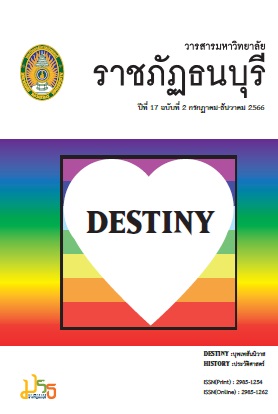การสำรวจความสัมพันธ์ระหว่างความรู้ทางสิ่งแวดล้อมและความตั้งใจซื้อของผู้บริโภคในการซื้อผลิตภัณฑ์ที่เป็นมิตรต่อสิ่งแวดล้อม
คำสำคัญ:
ความตั้งใจในการซื้อ , ความรู้เกี่ยวกับสิ่งแวดล้อม , ความไว้วางใจ , ฉลากเพื่อสิ่งแวดล้อม , ผลิตภัณฑ์ที่เป็นมิตรต่อสิ่งแวดล้อม ทฤษฎีพฤติกรรมตามแบบแผนบทคัดย่อ
บทความวิจัยนี้มีวัตถุประสงค์เพื่อศึกษาหาปัจจัยที่ส่งผลต่อความตั้งใจในการซื้อผลิตภัณฑ์ที่เป็นมิตรต่อสิ่งแวดล้อม โดยอ้างอิงทฤษฎีของพฤติกรรมตามแผน (Theory of Planned Behavior) เพื่อทำนายแนวโน้มการซื้อผลิตภัณฑ์ที่เป็นมิตรต่อสิ่งแวดล้อมของผู้บริโภคในประเทศไทย ทำการรวบรวมข้อมูลด้วยช่องทางออนไลน์จำนวน 400 ตัวอย่าง โดยทำการสุ่มตัวอย่างแบบโควตา (Quota Random Sampling) ให้มีการกระจายอย่างเท่ากันตามเพศและอายุ และทำการวิเคราะห์ข้อมูลด้วยแบบจำลองสมการโครงสร้าง (Structural Equation Model) ซึ่งผลการวิจัยพบว่า ความรู้เกี่ยวกับสิ่งแวดล้อมมีอิทธิพลเชิงบวกอย่างมีนัยสำคัญต่อความรู้เกี่ยวกับฉลากเพื่อสิ่งแวดล้อมและความไว้วางใจของผู้บริโภค แสดงให้เห็นว่าต้องมีความรู้และความเข้าใจเพื่อที่จะส่งผลให้ฉลากเพื่อสิ่งแวดล้อมถูกใช้งานได้อย่างมีประสิทธิภาพและมีความน่าเชื่อถือในข้อมูลที่นำเสนอ โดยค่าที่ได้จากแบบจำลองโครงสร้างมีดังนี้ x2 /df = 2.405, GFI = 0.832, AGFI = 0.804, CFI = 0.917, NNFI = 0.867 และ RMSEA = 0.059 ซึ่งบ่งบอกถึงคุณภาพและความเหมาะสมของโมเดลในงานวิจัย
Downloads
เอกสารอ้างอิง
Adrita, U.W. ,& Mohiuddin, M.F.(2020). Impact of opportunity and ability to translate environmental attitude into ecologically conscious consumer behavior. Journal of Marketing Theory and Practice. 28(2), pp.173-186.
Ajzen, I.(1991). The theory of planned behavior. Organizational behavior and human decision processes. 50(2), pp.179-211.
Alhosseini Almodarresi, S.M., Tabataba'i-Nasab, S.M., Bagheri Garabollagh, H. ,& Mohammadi, F. (2019). Does citizenship behavior have a role in changing attitude toward green products?.International Journal of Management Science and Engineering Management.14(4), pp.284-292.
Armitage, C.J. ,& Conner, M.(1999). Distinguishing perceptions of control from self‐efficacy: Predicting consumption of a low‐fat diet using the theory of planned behavior 1. Journal of applied social psychology. 29(1), pp.72-90.
Atkinson, L.,& Rosenthal, S.(2014). Signaling the green sell: The influence of eco-label source, argument specificity, and product involvement on consumer trust. Journal of Advertising. 43(1), pp.33-45.
Balaji, M.S., Jiang, Y.,& Jha, S.(2019). Green hotel adoption: a personal choice or social pressure?. International Journal of Contemporary Hospitality Management. 31(8), pp.3287-3305.
Bonini, S.M., Hintz, G.,& Mendonca, L.T.(2008).Addressing consumer concerns about climate change. McKinsey Quarterly. 2, p.52.
Chan, R.Y. ,& Lau, L.B. (2002). Explaining green purchasing behavior: A cross-cultural study on American and Chinese consumers. Journal of international consumer marketing. 14(2-3), pp.9-40.
Chen, A.,& Peng, N. (2012).Green hotel knowledge and tourists' staying behavior. Annals of Tourism Research. 39(4), pp.2211-2219.
Chen, M.F. ,& Tung, P.J.(2014).Developing an extended theory of planned behavior model to predict consumers’ intention to visit green hotels. International journal of hospitality management. 36, pp.221-230.
Chen, T.B. ,& Chai, L.T.(2010).Attitude towards the environment and green products: consumers' perspective. Management science and engineering. 4(2), p.27.
Chen, Y.S., Lin, C.Y.,& Weng, C.S.(2015). The influence of environmental friendliness on green trust: The mediation effects of green satisfaction and green perceived quality. Sustainability. 7(8), pp.10135-10152.
Chen, Y.S. ,& Chang, C.H.(2012).Enhance green purchase intentions: The roles of green perceived value, green perceived risk, and green trust. Management Decision. 50(3), pp.502-520.
Christmann, P.(2000). Effects of “best practices” of environmental management on cost advantage: The role of complementary assets. Academy of Management journal. 43(4), pp.663-680.
Cohen, J.(2013). Statistical power analysis for the behavioral sciences. Academic press.
D’Souza, C., Taghian, M. ,& Brouwer, A.R.(2021).Ecolabels information and consumer self-confidence in decision making: A strategic imperative. Journal of Strategic Marketing. 29(2), pp.141-157.
Darnall, N., Ji, H., & Vázquez-Brust, D.A. (2018). Third-party certification, sponsorship, and consumers’ ecolabel use. Journal of Business Ethics. 150, pp.953-969.
French, S. ,& Showers, L.(2008).Consumer lifestyles of health and sustainability: Insights from green consumer market segmentation. Research Review. 15(1), pp.31-34.
Gil, M.T. ,&Jacob, J.(2018). The relationship between green perceived quality and green purchase intention:A three-path mediation approach using green satisfaction and green trust. International Journal of Business Innovation and Research. 15(3), pp.301-319.
Gupta, S.,& Ogden, D.T.(2009). To buy or not to buy? A social dilemma perspective on green buying. Journal of consumer marketing. 26(6), pp.376-391.
Hair Jr, J.F., Matthews, L.M., Matthews, R.L. ,& Sarstedt, M.(2017). PLS-SEM or CB-SEM: updated guidelines on which method to use. International Journal of Multivariate Data Analysis. 1(2), pp.107-123.
Han, H., Hsu, L.T.J. ,&Lee, J.S.(2009).Empirical investigation of the roles of attitudes toward green behaviors, overall image, gender, and age in hotel customers’ eco-friendly decision-making process. International journal of hospitality management. 28(4), pp.519-528.
Han, H., Hsu, L.T.J. ,& Sheu, C.(2010). Application of the theory of planned behavior to green hotel choice: Testing the effect of environmental friendly activities. Tourism management. 31(3), pp.325-334.
Han, H. ,& Kim, Y. (2010). An investigation of green hotel customers’ decision formation: Developing an extended model of the theory of planned behavior. International journal of hospitality management. 29(4), pp.659-668.
Hartmann, P.,& Apaolaza-Ibáñez, V.(2012). Consumer attitude and purchase intention toward green energy brands: The roles of psychological benefits and environmental concern. Journal of business Research. 65(9), pp.1254-1263.
Henion, K.E.,& Wilson, W.H.(1976). The ecologically concerned consumer and locus of control. Ecological marketing. 131.
Hossain, I., Nekmahmud, M. ,& Fekete-Farkas, M.(2022). How do environmental knowledge, eco-label knowledge, and green trust impact consumers’ pro-environmental behaviour for energy-efficient household appliances?. Sustainability. 14(11), p.6513.
Foo, S., Hui, S.C.,& Leong, P.C. (2002).Web-based intelligent helpdesk-support environment. International Journal of Systems Science. 33(6), pp.389-402.
Jaiswal, D. ,& Kant, R., (2018). Green purchasing behaviour: A conceptual framework and empirical investigation of Indian consumers. Journal of Retailing and Consumer Services. 41, pp.60-69.
Kamalanon, P., Chen, J.S. and Le, T.T.Y.(2022). “Why do we buy green products?” An extended theory of the planned behavior model for green product purchase behavior. Sustainability. 14(2), p.689.
Kautish, P. ,& Sharma, R.(2019).Value orientation, green attitude and green behavioral intentions: an empirical investigation among young consumers. Young Consumers, 20(4), pp.338-358.
Lin, S.T.,& Niu, H.J.(2018).Green consumption: E nvironmental knowledge, environmental consciousness, social norms, and purchasing behavior. Business Strategy and the Environment. 27(8), pp.1679-1688.
McCarty, J.A. ,& Shrum, L.J. (1994). The recycling of solid wastes: Personal values, value orientations, and attitudes about recycling as antecedents of recycling behavior. Journal of business research. 30(1), pp.53-62.
McCluskey, J.J.,& Loureiro, M.L.(2003). Consumer preferences and willingness to pay for food labeling: A discussion of empirical studies. Journal of Food Distribution Research. 34(856-2016-57150), pp.95-102.
Mei, O.J., Ling, K.C.,& Piew, T.H.(2012). The antecedents of green purchase intention among Malaysian consumers. Asian Social Science. 8(13), p.248.
Mostafa, M.M.(2009). Shades of green: A psychographic segmentation of the green consumer in Kuwait using self-organizing maps. Expert systems with Applications. 36(8), pp.11030-11038.
Ottman, J.A.(1993). Industry's response to green consumerism: Journal of Business Strategy. 13 (4), pp. 3–7.
Paço, A.,& Lavrador, T.(2017). Environmental knowledge and attitudes and behaviours towards energy consumption. Journal of environmental management. 197, pp.384-392.
Paul, J., Modi, A. ,& Patel, J.(2016). Predicting green product consumption using theory of planned behavior and reasoned action. Journal of retailing and consumer services. 29, pp.123-134.
Polonsky, M.J., Vocino, A., Grau, S.L., Garma, R.,& Ferdous, A.S.(2012). The impact of general and carbon-related environmental knowledge on attitudes and behaviour of US consumers. Journal of Marketing Management. 28(3-4), pp.238-263.
Rana, J.,& Paul, J.(2017). Consumer behavior and purchase intention for organic food: A review and research agenda. Journal of Retailing and Consumer Services. 38, pp.157-165.
Rusyani, E., Lavuri, R.,& Gunardi, A.(2021). Purchasing eco-sustainable products: Interrelationship between environmental knowledge, environmental concern, green attitude, and perceived behavior. Sustainability. 13(9), p.4601.
Sreen, N., Purbey, S. ,& Sadarangani, P. (2018). Impact of culture, behavior and gender on green purchase intention. Journal of retailing and consumer services. 41, pp.177-189.
Sun, Y., Wang, S., Gao, L. ,& Li, J.(2018). Unearthing the effects of personality traits on consumer’s attitude and intention to buy green products. Natural Hazards. 93, pp.299-314.
Taufique, K.M.R., Siwar, C., Chamhuri, N.,& Sarah, F.H.(2016). Integrating general environmental knowledge and eco-label knowledge in understanding ecologically conscious consumer behavior. Procedia Economics and Finance. 37, pp.39-45.
Taufique, K.M.R., Vocino, A.,& Polonsky, M.J.(2017). The influence of eco-label knowledge and trust on pro-environmental consumer behaviour in an emerging market. Journal of Strategic Marketing. 25(7), pp.511-529.
Taylor, B. L., Routman, S.,& Utter, M. F. (1975). The control of the synthesis of pyruvate carboxylase in Pseudomonas citronellolis. Evience from double labeling studies. Journal of Biological Chemistry. 250(6), pp. 2376-2382.
Thi Tuyet Mai, N. (2019). An investigation into the relationship between materialism and green purchase behavior in Vietnam and Taiwan. Journal of Economics and Development. 21(2), pp.247-258.
Thøgersen, J., De Barcellos, M.D., Perin, M.G., & Zhou, Y.(2015). Consumer buying motives and attitudes towards organic food in two emerging markets: China and Brazil. International Marketing Review. 32(3/4), pp. 389-413.
Wee, C.S., Ariff, M.S.B.M., Zakuan, N., Tajudin, M.N.M., Ismail, K., &Ishak, N.(2014). Consumers perception, purchase intention and actual purchase behavior of organic food products. Review of Integrative Business and Economics Research. 3(2), p.378.
Yazdanpanah, M. ,& Forouzani, M. (2015). Application of the Theory of Planned Behaviour to predict Iranian students' intention to purchase organic food. Journal of Cleaner Production. 107, pp.342-352.
Zaidi, S.M.M.R., Yifei, L., Bhutto, M.Y., Ali, R.,& Alam, F.(2019). The influence of consumption values on green purchase intention: A moderated mediation of greenwash perceptions and green trust. Pakistan Journal of Commerce and Social Sciences. 13(4), pp.826-848.
Zikmund-Fisher, B.J., Smith, D.M., Ubel, P.A. and Fagerlin, A.(2007). Validation of the Subjective Numeracy Scale: effects of low numeracy on comprehension of risk communications and utility elicitations. Medical Decision Making. 27(5), pp.663-671.
ดาวน์โหลด
เผยแพร่แล้ว
เวอร์ชัน
- 2024-07-01 (2)
- 2023-12-26 (1)
รูปแบบการอ้างอิง
ฉบับ
ประเภทบทความ
สัญญาอนุญาต
ลิขสิทธิ์ (c) 2023 มหาวิทยาลัยราชภัฏธนบุรี

อนุญาตภายใต้เงื่อนไข Creative Commons Attribution-NonCommercial-NoDerivatives 4.0 International License.
บทความที่ได้รับการตีพิมพ์เป็นลิขสิทธิ์ของมหาวิทยาลัยราชภัฏธนบุรี
ข้อความที่ปรากฏในบทความแต่ละเรื่องในวารสารวิชาการเล่มนี้เป็นความคิดเห็นส่วนตัวของผู้เขียนแต่ละท่านไม่เกี่ยวข้องกับมหาวิทยาลัยราชภัฏธนบุรีและบุคลากรท่านอื่น ๆ ในมหาวิทยาลัยฯ แต่อย่างใด ความรับผิดชอบองค์ประกอบทั้งหมดของบทความแต่ละเรื่องเป็นของผู้เขียนแต่ละท่าน หากมีความผิดพลาดใด ๆ ผู้เขียนแต่ละท่านจะรับผิดชอบบทความของตนเองแต่ผู้เดียว







